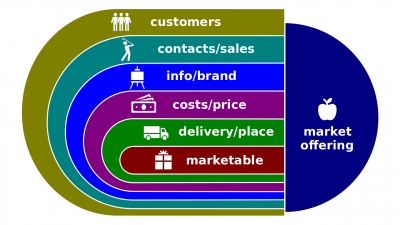Market exchangeable
A marketable (alternatively known as a marketable product or, simply, product) is any item that can be sold or serve as a not-for-sale source of the items that can be sold.
Contents
Definitions
According to Marketing Management by Keller and Kotler (15th edition),
- Product. Anything that can be offered to a market to satisfy a want or need, including physical goods, services, experiences, events, person, places, properties, organizations, information, and ideas.
According to Managing Quality by Foster (6th edition),
- Product. A tangible good that is produced for a customer.
Types
Intangible vs not-for-sale vs tangible
- With regard to its nature, a marketable can be one of the following:
- Intangible, which is something identifiable, but not tangible such as concepts, data, enterprises, events, experiences, ideas, information, labor, marketable permits, marketable securities, personal time, services, software, and any other non-physical property.
- Not-for-sale, which is anything that is not (such as publicly-owned locations or places) and/or cannot (such as communities, governments, and persons) be private properties.
- Tangible, which is a physical good such as animals, buildings, hardware, land, produce, and any other physical property.
Earned vs made vs purchased
- With regard to the way of its completion, a marketable can be one of the following:
- Work product or produced marketable, which is made as a solution or component of a solution that is the primary result of a project or operations. In other words, a produced marketable is an article or substance that is produced and refined for sale.
- Purchased item available for sale.
- Earned entity, which is not just a work product and cannot be sold itself, but is a not-for-sale source of the items that can be sold. These sources include communities, publicly-owned locations, governments, and people.
Features
- Marketing mix. A model representing distinguishable components of any product, which must include a deliverable, product delivery, and product charge.
- Product scope. All the features and functions that characterize a product.
- Service. Work carried out or on behalf of others.
